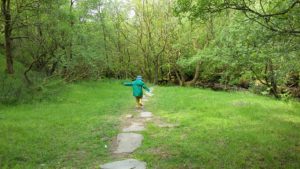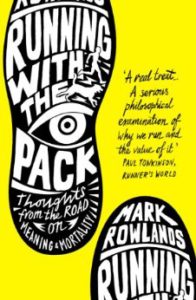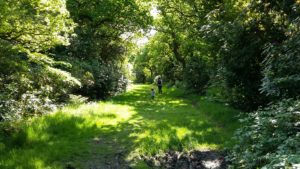Intrinsic Value, Boys and the Outdoor Adventure
My love with the outdoors is as old as my living memory. I’ve walked, run and jumped outside for as long as I’ve been able to walk. My richest experiences have been in wide open spaces. Some of these include:
- Solo climbing my first ‘Munro‘ as a teenager
- Fire walking at a spiritual retreat centre as the sun set
- Breathing in thin air at the highest paved border crossing in the world
And so much more.
And now my son is a bit older, I want to be able to share a whole range of new experiences with him. I’ve figured out the ‘How’ and we’re building up our walking distances and degree of adventurousness on our adventures.
But what about the ‘Why’? – What is the reason for all of this? Is it possible to be imposing my will on him like the pushy football Dads I’ve criticised in the past?
The Problem of Adulthood: Everything Needs a Reason
There are two possible ‘Whys’ for the outdoor adventure.
These are:
- Tangible value
- Intrinsic value
I’ll come on to the meaning of intrinsic value in a moment but for now I want to focus on the tangible – literally what you can touch. If something is tangible, it exists for a purpose, for a reason. Right now I’m typing this in a plastic keyboard. It has tangible value – it’s allowing me to write this post.
I can physically touch the keyboard too so it’s a good example. But what about activities?
Imagine you are at the gym. You go there for a reason – to train your body so that it’s bigger, leaner or to make you fitter, faster or stronger.
Going to the gym to lift weights has tangible value because you will see the results of your hard work. Some of those benefits are instant – a pump or endorphin rush.
Other benefits are longer term – measured over years. I’m into my 7th year of lifting weights and just beginning to see the physique I wanted when I started. Seven years – two more than I spent in high school.
As an adult, most of what you do on a daily basis is for tangible value:
- You go to work so you can pay the mortgage
- You get home in time to bath the kids so they grow up knowing you care
- You take the kids to gymnastics because it teaches them co-ordination and balance
You do these things for an outcome – something you can and hopefully will experience in the future. That’s what I mean by ‘tangible value’.
When you think about outdoor adventures and why you do it, is it for tangible value? Do you aim to increase your son’s confidence, fitness and appreciation of the outdoors?
Maybe you want to use that experience to teach him about life. If so, that’s great and honourable. Your kids are fortunate to have you as their Dad.
Plenty of kids are denied access to the outside by the very people who are supposed to be caring for them – their parents.
But what if there was another way to experience the great outdoors with your son. A way which is so radically different to the Tangible Value approach.
Warning: This is a difficult concept – I’m only just starting to figure it all out.
Intrinsic Value and Running with the Pack
Every so often you read a book that is so revolutionary, so radical, that it changes your outlook on life forever. One such book is Running with the Pack by Mark Rowlands.
Rowlands is a thinker, philosopher and runner. In this beautiful and moving book, he charts a long period of his life which begins when he adopts a dog – part wolf. He begins to go for runs to tire the wolf-dog out.
But as his journey progresses, he starts to think about the intrinsic value of running. Is it possible to run, not for exercise or fitness or stress relief, but for the sake of running itself?
He likens this to a child playing – the child has no concept of any benefit other than the activity he his engaged in. The child and his game exists completely in the present. Or, if you prefer, in the moment.
But when we become adults, we begin to lose the ability to engage in activities for their intrinsic value. If Rowlands can run for long enough, perhaps he can regain this ability?
That’s all great and powerful insight, but what does that have to do with taking your son into the outdoors?
Here’s my thought:
What if it were possible to spend time in the outdoors with your son(s) for the intrinsic value contained within that activity?
What would that look like? And can it have any benefit as we come to terms with a changing view of fatherhood in the Western world?
Intrinsic Value and the Outdoor Adventure
The greatest advantage in experiencing the intrinsic (that which is contained within the activity) is that you can truly share in the experience with your son.
You take a conscious decision not to have ulterior motives for pointing out the lazy lizard on a summer’s walk. It’s enough to enjoy it’s beauty, colours and movement in the moment.
I’ve started to do this more. It’s a conscious decision. I know a fair bit about the British countryside – trees, habitats, species and weather patterns as well as archaeology. It’s a blessing as well as a curse.
Why a curse? Because my instinct is to teach my son about all the things around him instead of enjoying our time together.
I was speaking to a Dad who’s son recently turned 6. He said that he’d realised that he’d already shared 1/3 of his son’s childhood. A sobering thought for all of us wanting to make the most of our time together.
My son has plenty of time to learn all he wants to about the outdoors. It shouldn’t necessarily be at the expense of enjoying our time together.
So I’ve started to take a conscious decision to be in the moment on our walks together instead of always caught up in learning points.
How you Can Add Intrinsic Value
I’m not sure about the concept of ‘adding’ intrinsic value – it already exists. Can you add something that is already there? Whatever, you know what I mean.
How can you experience the intrinsic value? Here are my top three tips:
1. Don’t have an agenda. Wouldn’t it be nice to go on a walk or experience the outdoors without having a plan or an idea of why you’re doing it – other than to experience it. To be completely in the moment. If you don’t have an agenda (even a mental one), you are much more likely to have the experience you want.
2. Don’t take photos. Did you ever think about why you take photos of EVERYTHING? Is it so you can post it on Facebook or Twitter, or Whatsapp them to your friends and family? Or so that you can capture that moment and keep it forever. How about you switch your phone off and leave any other camera equipment at home? Enjoy the experience – don’t try and save it on a digital file for all eternity.
3. Enjoy silence. Think about this: if you talked less and listened more are you more or less likely to be in the moment on your outdoor walks and adventures? There is no need for you to fill every moment with conversation. You focus on birdsong or running water when you’re the one making all the noise.
The book Gorilla Mindset has some useful advice on active meditation and being ‘in the moment’ – read my review here.
Summary – Balance in All Things
As a continue through life, I see more and more that balance is the key in many (if not all) things. The same goes for this approach. Forcing yourself to focus on the intrinsic value of the activity you are engaged in has value – as I hope I’ve demonstrated.
But there are times when teaching and planning are required for your adventures (I wrote as much in an earlier post). But enjoying the intrinsic value of an outdoor adventure enhances that shared experience between you and your son.
You may only have a few short years together but you have the opportunity to the most of those opportunities.
P.S. Enjoyed this? I’ve got a mailing list which I use to keep subscribers up to date with new posts (like this). If that’s not for you, don’t sign up here.
P.P.S You can buy Running with the Pack by Mark Rowlands by clicking here.



